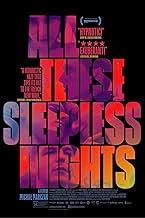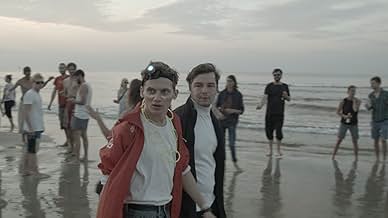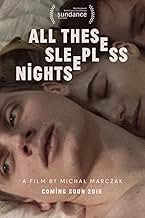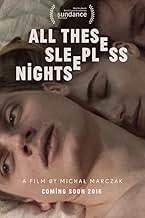This film is a documentary, but unlike any I have seen before. It follows primarily one (though at times, up to three) Polish 20-ish year olds (19-23 would be my guess) over the course of a year as they explore the night, usually at parties, music festivals, or wandering home through the streets - but the experience is captured so intimately that I did not realize I was watching a documentary until I read more about the film the day after seeing it (at Full Frame Film Festival).
Above all else, All These Sleepless Nights overwhelms with its cinematographic and editing style - shot like an art-house blockbuster with 2.35 aspect ratio, 24fps flow, and a shallow depth-of-field, its stabilized shots lure you into that cinematic mode where you forget that you're watching a movie and begin to feel one with the characters. This is something I have never before experienced with a documentary - the cinematography is so fluid and characters so flawlessly apathetic to the presence of the camera that I was certain this was a strange scripted fiction. And of course, the degree with which Marczak interfered with reality when shooting this film is quite uncertain (were the relationships real? Was the dialogue pre-written?), but that really doesn't matter, because he absolutely succeeded in capturing the reality of a 20ish- year old's mind. And this is why the film was so stunning for me.
I'm a 21-year old college student (in the USA, not Warsaw), and watching this film felt like scrolling through the memories of my past couple years. I have never felt a film so accurately capture a state of mind that I've experienced, and I believe Marczak was able to do this largely through two creative choices.
First, the aforementioned cinematography and editing lead to a dreamy capture of the scenes, with diegetic sounds blending with non-diegetic enhancements that make everything feel like a perfectly accurate view of the scene not through a camera and microphone, but through the mind's eye, with some distortion from alcohol and memory.
Second, Marczak lets on to very little of the subjects' lives beyond what we see in the nightlife, with every shot focused on the present (and perhaps the present thoughts of the subjects), and absolutely no hint of what the characters may do during the day, or what goals and aspirations they may have. When their relationships and musings enter their minds as they're partying at a club or lounging by the Vistula, Marczak lets these thoughts and words be seen, but even then he exercises a discipline in never letting the viewer know what these characters are doing in their 'serious' lives, or even precisely what age they are / if they're in college or the working world. Because of this, all we see is a series of present moments, none glorified or painted to look like anything other than what they are - memories pleasant and boring alike. And so all it takes to resonate with the characters is a similar mindset, a similar experience of night and thought and life, not necessarily a shared knowledge of Polish school or work life.
Ultimately, this film does nothing more and nothing less than capture the mind and memories of a college-type urban youth, and so could easily be criticized for offering little in terms of commentary or guidance on these experiences. In fact, it all seems quite pointless at times, but this only serves to deepen the reality of Marczak's portrait - because any self-awareness or normative narrative in this film wouldn't make it a true portrait, a true image of the mind. If Marczak set out to get in the mind of myself and those with similar experiences to me when he made this movie, he has succeeded beyond my wildest expectations.
























